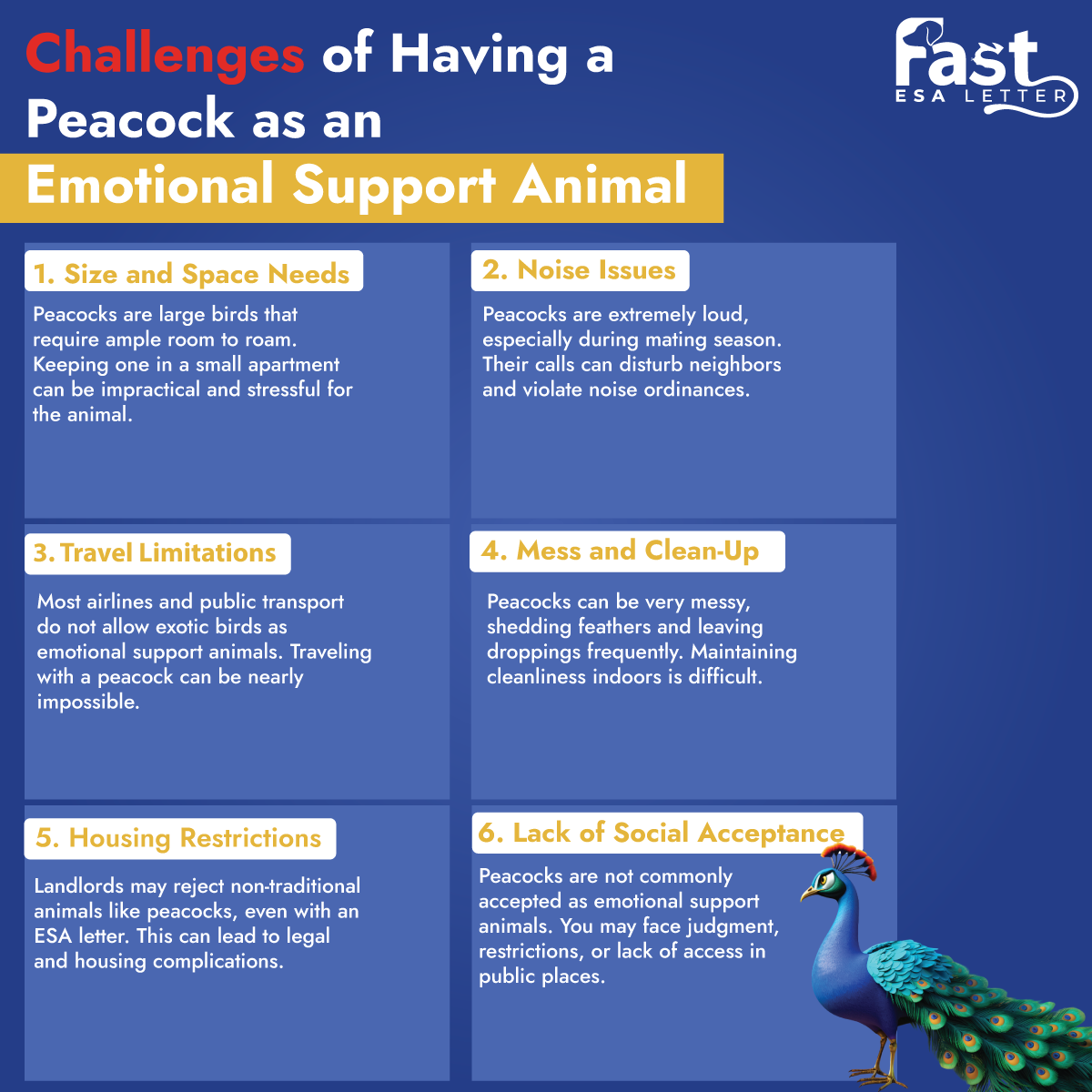Can a Peacock Be an Emotional Support Animal?

Robert Clendenin, MD
When you think of emotional support animals, a dog or cat probably comes to mind. But emotional support animals aren’t limited to traditional pets. Legally speaking, even a peacock can qualify as an ESA—and yes, that’s been tested in real life.
In fact, you may have heard about Dexter the Peacock, who made headlines after being denied boarding on a flight despite being labeled as an emotional support animal. It raised a lot of eyebrows, but also an important question:
Can an exotic animal like a peacock really be an emotional support animal in the U.S.? Is it legal? And what kind of rights do you actually have?
Let’s break it down.

Can a Peacock Qualify as an Emotional Support Animal?
Yes, a peacock can qualify as an emotional support animal if recommended by a licensed mental health professional. Under the Fair Housing Act (FHA), emotional support animals aren’t limited to dogs or cats. Birds, rabbits, pigs, and even miniature horses have been recognized as ESAs in certain cases. A peacock, as a bird species, may qualify if it helps relieve symptoms of a diagnosed mental or emotional health condition.
Is It Legal to Have a Peacock as an ESA in the U.S.?
Yes, but with strict limitations. The Americans with Disabilities Act (ADA) does not recognize ESAs as service animals, meaning public access rights are limited. However, the Fair Housing Act offers protection to ESA owners in housing situations. Landlords must provide reasonable accommodation unless the animal:
- Poses a direct threat,
- Causes significant property damage,
- Or is deemed impractical due to its size or nature.
Since peacocks are large, vocal, and can be aggressive in mating season, legal permission may vary depending on local and property-specific rules.
Do Airlines Allow ESA Peacocks on Flights?
This rule gained national attention in 2018 when an airline famously denied boarding to a passenger with an ESA peacock named Dexter. The event triggered further scrutiny of ESA policies.
Today, airlines are not obligated to accept peacocks or other exotic animals as ESA travel companions. Only trained service dogs are protected under federal air travel laws.
Are Peacocks Allowed in ESA-Friendly Housing?
Under the Fair Housing Act, landlords must consider accommodation requests for ESA animals, including non-traditional pets like peacocks. However, they may reject the request if:
- The peacock is too large for the unit,
- The animal is excessively noisy or disruptive,
- There’s a health or safety concern.
Therefore, housing requests involving a peacock ESA must be reviewed case-by-case basis. It’s advisable to provide thorough documentation and a legitimate ESA letter to support your request.
How to Get an ESA Letter for a Peacock?
Since peacocks are considered exotic emotional support animals, your documentation needs to be accurate, compliant, and professionally evaluated. Here’s how you can easily get an ESA letter for your peacock through Fast ESA Letter’s secure online process:
Step 1: Schedule Your Appointment
Step 2: Complete a Private Consultation
Step 3: Receive the ESA Letter Approval
The Fast ESA Letter process is HIPAA-compliant, confidential, and designed to help individuals receive valid ESA documentation quickly, without unnecessary delays or paperwork.
Challenges of Having a Peacock as an Emotional Support Animal
1. Noise Levels
2. Space Requirements
3. Temperament and Aggression
4. Zoning & Legal Restrictions

- Noise Levels
Male peacocks are infamously loud, especially during mating season. Their calls can reach up to 130 decibels—comparable to a jackhammer or leaf blower. This can lead to noise complaints, particularly in urban or suburban neighborhoods. - Space Requirements
Peacocks aren’t suited to small living spaces. They need large, open outdoor enclosures with secure fencing to roam, perch, and stay safe. Keeping them in a typical apartment or condo simply isn’t practical—or ethical. - Temperament and Aggression
While not always aggressive, peacocks can become territorial and agitated, especially during breeding seasons. This behavior can pose a risk in shared or multi-pet environments, especially if children or other animals are present. - Zoning & Legal Restrictions
Many local ordinances and HOA (Homeowners Association) regulations prohibit exotic birds or classify peafowl as farm animals, which may not be allowed in residential zones. Violating such rules could lead to fines or eviction notices.
Are Exotic Emotional Support Animals Becoming More Common?
Surprisingly, yes. As emotional support animals become more widely recognized, more people are exploring non-traditional species for companionship—beyond just dogs and cats.
In fact, a study published in the Journal of Mental Health & Animals revealed that over 16% of ESA requests in the U.S. involved exotic or unconventional animals like birds, reptiles, rabbits, and even goats.
That said, approvals for exotic ESAs like peacocks remain rare, mainly due to challenges in housing, public safety, and legal compliance. Most clinicians recommend domesticated animals unless the emotional bond is exceptionally strong and well-documented.
Final Thoughts
Frequently Asked Questions (FAQs)
Can You Have A Peacock As An Emotional Support Animal In The U.S.?
Are Emotional Support Peacocks Allowed On Airplanes?
No. Airlines are not required to accept emotional support animals, especially exotic ones like peacocks, after the 2021 ACAA revision.
Do Landlords Have To Accept Peacocks As ESAs?
What Legal Rights Do I Have With A Peacock ESA?
How Do I Prove That My Peacock Is An Emotional Support Animal?
Can An HOA Deny My Emotional Support Peacock?
Post Author
Prince Sharma
Related Articles
Can a Bird Be An Emotional Support Animal?
Can a Bird Be An Emotional Support Animal?Yes, a bird can be your emotional support animal (ESA). These feathered friends offer incredible comfort and emotional support. There’s no need for special training. A ESA letter from a licensed mental health...
Can Emotional Support Fish Improve Your Mental Health?
Can Emotional Support Fish Improve Your Mental Health?Yes, emotional support fish can improve your mental health. Observing their peaceful movements can reduce stress and anxiety.Medically Reviewed by Robert Clendenin, MDAn ESA Letter makes...
Rodents as an Emotional Support Animal
Choosing Rodents as an Emotional Support Animal.Yes, rodents can be emotional support animals. While less common than dogs or cats, rodents like guinea pigs and rats can provide emotional support and companionship, making them suitable for...
Live Free with Your ESA!
An ESA Letter Unlocks Freedom!






